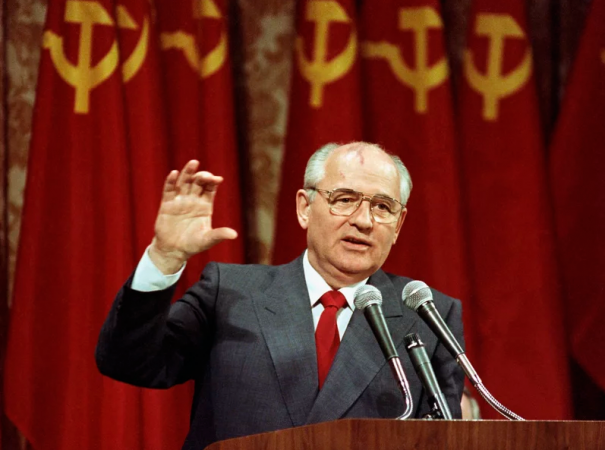
Moscow: The last Soviet leader who played a key role in ending the Cold War, Mikhail Gorbachev, who died in Moscow on Tuesday at the age of 91, received tributes from world leaders.
Russian news agencies reported Gorbachev's death, saying he had died "after a serious and prolonged illness" in a major Moscow hospital.
The last surviving leader of the Cold War, Gorbachev served as president from 1985 to 1991 and was instrumental in melting the icy relationship between the US and the Soviet Union.
His reforms as leader of the Soviet Union transformed his nation and enabled Eastern Europe to break free from Soviet rule, making his life one of the most important of his era.
He was praised in the West for the changes he brought and was awarded the Nobel Peace Prize in 1990, but many Russians despised him for ending his country's status as a superpower.
He has spent a large part of the past two decades on the political fringes, occasionally urging the White House and the Kremlin to patch things up as hostilities reached the height of the Cold War following Russia's annexation of Crimea in 2014 and Its invasion of Ukraine had begun. this year.
Despite occasional difficulties in their relationship, President Putin offered Gorbachev his "deepest sympathy" upon learning of his passing.
According to Kremlin spokesman Dmitry Peskov, "Putin will send a telegram of condolence to his family and friends in the morning."
Gorbachev's health became more precarious in his later years, and he spent much of the pandemic in self-quarantine to protect himself from the coronavirus.
Gorbachev was well-liked in the West and was known as Gorby. He is best remembered for easing nuclear tensions between the US and the Soviet Union in the 1980s and freeing Eastern Europe from the Iron Curtain.
When the Berlin Wall fell a year earlier, his decision to halt Soviet forces was deemed necessary to maintain the peace of the Cold War. He was awarded the Nobel Peace Prize for negotiating the historic nuclear weapons deal with US President Ronald Reagan.
He was also praised in the West for initiating changes that led to greater transparency and public discourse and accelerated the disintegration of the Soviet Empire.
According to UN Secretary-General Antonio Guterres, Gorbachev was hailed as "a unique statesman who changed the course of history" and "did more than any other man for a peaceful end to the Cold War".
Gorbachev was praised by US Vice President Joe Biden as a "rare leader" who improved global security.
In a statement, Biden referred to Gorbachev's democratic reforms, saying, "These were the actions of a rare leader - with a vision that a different future was possible and the courage to risk his entire career to achieve it." " Millions of people are now living in a safer world with more freedom.
In reference to Putin's invasion of Ukraine, British Prime Minister Boris Johnson said Gorbachev's "relentless commitment to open up Soviet society is an example to all of us."
He was praised by French President Emmanuel Macron as "a man of peace whose choice opened the way to freedom for the Russians". His dedication to European peace changed the course of our shared history.
World leaders including Biden and former German Chancellor Angela Merkel congratulated him on his 90th birthday. He was the first Russian leader to have crossed the age of 90.
At home, Gorbachev remained a divisive figure and struggled to come to terms with Putin.
The disintegration of the Soviet Union, which brought about a decade of widespread poverty and a decline in Russia's stature on the international stage, was tragic for Putin and many Russians.
Putin relies on Soviet-era achievements to support Russia's claim to greatness and its prestige. Many Russians still have fond memories of Soviet times.
The younger Boris Yeltsin succeeded Gorbachev after the dissolution of the Soviet Union, becoming the first President of post-Soviet Russia.
Gorbachev was then put on the back burner and devoted himself to charitable and educational endeavors.
In a disastrous attempt to return to politics, he ran for the presidency in 1996, but received only 0.5% of the vote.
Over the years, he saw Putin take back many of his important achievements.
He gave a portion of his Nobel Prize money to help Russia's leading independent newspaper, Novaya Gazeta, founded in 1993, buy its first computers.
But during Putin's two-decade rule, the pressure on newspapers and other independent media outlets in Russia increased.
Novaya Gazeta, whose editor-in-chief Dmitry Muratov received the Nobel Peace Prize last year, ceased publication at the end of March, following Moscow's military intervention in Ukraine.
Gorbachev himself remained silent about Russia's military intervention in Ukraine, despite his foundation's call for "an early cessation of hostilities and the immediate start of peace talks".
Unlike other Soviet leaders, Gorbachev openly expressed his affection and support for his wife Raisa, a beautiful woman who often appeared with him in public and whose untimely death from cancer was a tragic blow.
According to a source close to the Gorbachev family, he will be buried with Raisa at the Novodevichy Cemetery in Moscow, where several other notable Russians, including Yeltsin, are also buried.
Kiev: Putin should stand in world court trial for starting a war
Ukraine launches an offensive to retake the south that Russia currently controls